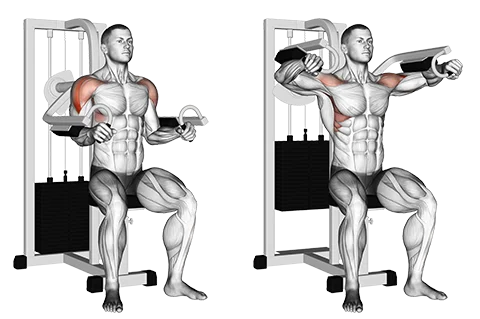Introduction
The Machine Lateral Raise is a strength training exercise that primarily targets the side deltoids (shoulder muscles). It helps build and shape the outer shoulders, providing balance to the overall shoulder complex. This exercise is particularly beneficial for individuals aiming to improve their lateral (side) shoulder definition and strengthen their rotator cuff muscles. Machine Lateral Raise is effective due to its controlled movement and reduced risk of injury compared to free weight alternatives.
Muscles Worked
- Primary: Deltoid (Middle and Rear)
- Secondary: Serratus Anterior, Rotator Cuff Muscles (Supraspinatus, Infraspinatus, Teres Minor), Trapezius
How to Do It (Step-by-Step)
- Stand with your feet shoulder-width apart, holding light dumbbells by your sides. Your palms should face the body and your elbows slightly bent.
- Keeping your upper arms stationary, lift the dumbbells to the side until they are level with your shoulders, creating a straight line from the front of your shoulder to the back of your hand.
- Maintain a slight bend in your elbows, avoid moving your torso, and ensure that you are raising the weights only with your shoulders and not your arms or body. Keep your wrists straight during the movement.
Tip: Remember to breathe smoothly throughout the exercise and engage your core muscles for stability.
Rep & Rest Guidelines
- Strength: 4–6 reps, 2–3 min rest
- Hypertrophy: 8–12 reps, 60–90 sec rest
- Endurance: 12–20 reps, 30–60 sec rest
Make your workouts more efficient with Auto Progression.
Stay on track and optimize your rest periods using the Rest Timer.
Form Tips
- Maintain a neutral spine and avoid arching or rounding the back. Keep your core engaged throughout the exercise.
- Stand straight with feet shoulder-width apart for stability, and slightly bend your elbows to keep them in line with the rest of your arm. This will help you perform the lateral raise correctly without straining your shoulders.
- Use light weights that allow you to control the movement and maintain proper form throughout each repetition. Aim for a slow and controlled tempo, focusing on contracting the side deltoids (shoulder muscles) as you lift the weights upwards and lower them back down in a controlled manner.
When to Use It
- Strengthening shoulder abduction for swimmers
- Building side deltoids for better posture in daily life
- Isolating the lateral head of the deltoid during resistance band exercises
- Keep track of your machine lateral raise progress with Workout History
The machine lateral raise primarily targets the shoulders, specifically the middle deltoids.
Aim for 3-4 sets of 10-12 reps per set for muscle growth, or adjust based on your fitness goals.
Stand upright with a slight bend in your knees, grab the handles at shoulder width, and lift up until your arms are parallel to the ground.
It is recommended to consult with a healthcare professional before performing any exercises that may exacerbate existing shoulder issues.
Yes, you can perform seated or standing lateral raises, as well as using cable machines for different angles and resistance.

